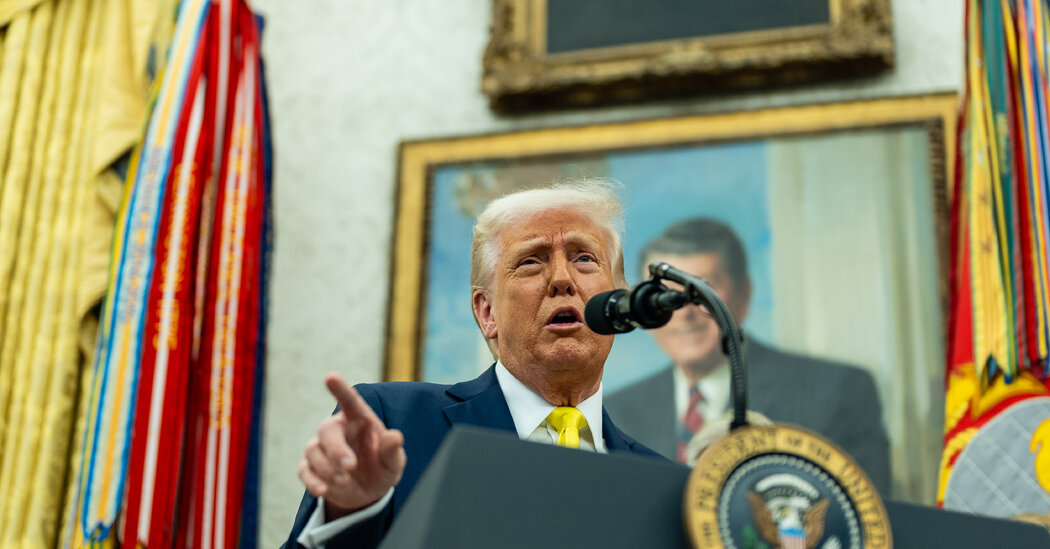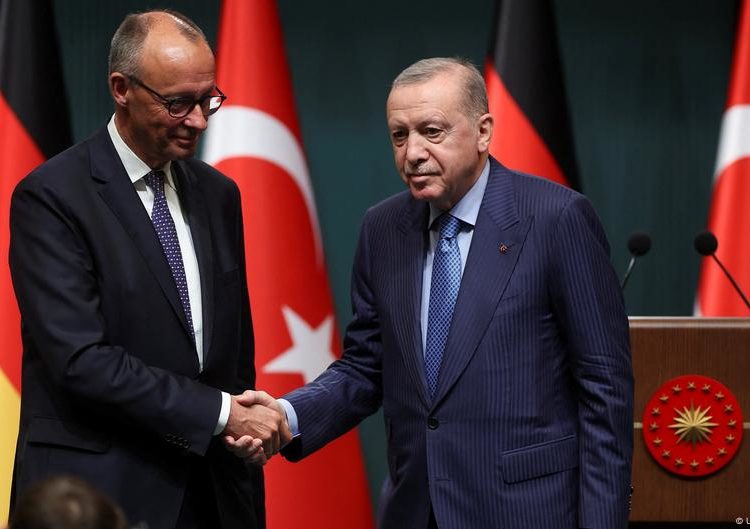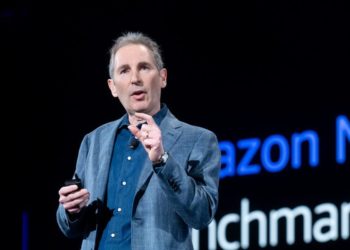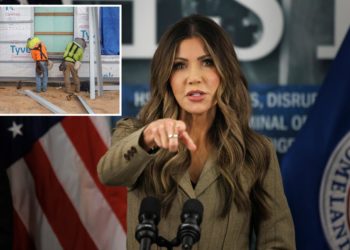Global economic leaders are gathering in Washington this week for the spring meetings of the International Monetary Fund and the World Bank. They are arriving in a United States that is vastly different from the one they visited during the same forum last fall.
Recent debates over industrial policy and whether the world economy could achieve a soft landing have been replaced by anxiety over President Trump’s trade war, revived inflation fears and new worries about the prospect of a global recession. The multilateral institutions that are hosting the meetings and that receive funding from the United States are also under increasing pressure to prove their relevance to the Trump administration while avoiding confrontations that could compel Mr. Trump to withdraw from them entirely.
“The post-World War II rules-based system of global governance, which the United States played a key role in fashioning, is crumbling before our eyes,” said Eswar Prasad, a former China director of the I.M.F.
“The Trump administration has left little doubt about its distaste for practically every multilateral institution, including the I.M.F. and the World Bank, because it views these institutions’ recommendations and policies as not always perfectly aligned with narrowly defined American interests,” Mr. Prasad said.
Mr. Trump has ratcheted up tariffs to their highest levels in more than a century, creating widespread global economic uncertainty and most likely disrupting supply chains. At the same time, a sharp pullback in U.S. foreign aid is putting sudden pressure on poor countries that have for decades relied on American support to provide food and medicines for the world’s most vulnerable populations.
Mr. Trump has said little publicly about the I.M.F. or the World Bank since taking office in January. But officials at both institutions have been watching warily as the president upends the global trading system, rapidly overhauls the federal government and cracks down on foreign nationals working and studying in the United States.
Before Mr. Trump was elected, the Project 2025 policy blueprint drafted by his conservative allies called for the United States to withdraw from the I.M.F. and the World Bank. Many Republicans have concerns about their policies that focus on promoting equity and combating climate change.
“I think the I.M.F. is going to try to maintain a low profile during these meetings because it is awaiting the Trump administration’s review of the U.S. participation in multilateral organizations,” said Mark Plant, a senior policy fellow at the Center for Global Development. “There are no clear signals as to what direction the United States might move.”
While the Trump administration could pull out of the I.M.F. and the World Bank, doing so would be complicated and most likely cede more global influence to China by giving it more sway in how the institutions are operated.
The I.M.F. could attract Mr. Trump’s attention this week when it offers its first assessment of the impact of his tariff policies. Last week, Kristalina Georgieva, the managing director of the fund, said Mr. Trump’s trade actions were damaging the world economy and signaled that the I.M.F. would lower its growth forecasts and raise its inflation projections.
“Ultimately, trade is like water,” Ms. Georgieva said in a speech. “When countries put up obstacles in the form of tariff and nontariff barriers, the flow diverts.”
The I.M.F.’s latest World Economic Outlook projects that global output will slow to 2.8 percent this year from 3.3 percent in 2024. That is half a percentage point lower than the fund’s forecast in January.
Much of the downgrade for this year can be attributed to the impact of the tariffs on the United States, the world’s largest economy, which was already poised to lose momentum this year. The I.M.F. expects U.S. output to slow to 1.8 percent in 2025, down from 2.8 percent last year. That is nearly a full percentage point slower than the 2.7 percent growth that the I.M.F. forecast for the United States in January, when it was the strongest economy in the world.
Ms. Georgieva added: “Some sectors in some countries may be flooded by cheap imports; others may see shortages. Trade goes on, but disruptions incur costs.”
The World Bank is perhaps in an even more precarious position than the I.M.F.
The United States is the bank’s largest shareholder. If America tried to withdraw, it would substantially reduce the bank’s lending power and influence. The bank’s president is selected by the United States, and Ajay Banga was a selection of the Biden administration in 2023, after David Malpass, whom Mr. Trump tapped for the job in his first term, resigned early.
The mission of the World Bank has become heavily focused on combating climate change, which the Trump administration views with deep skepticism. Upon taking leadership of the bank, Mr. Banga committed to channel 45 percent of the bank’s funds to climate-related projects, an increase of 10 percentage points from his predecessor.
The World Bank has also been committed to promoting diversity, equity and inclusion — which the Trump administration opposes — in its policy work.
“Greater gender and racial equity, enhanced ways to serve staff living with disabilities and stronger support for L.G.B.T.+ staff are among our key priorities,” Mr. Banga wrote in a 2022-23 report on D.E.I.
A former finance executive, Mr. Banga has sought to play up a pragmatic and transactional approach that could appeal to Mr. Trump’s sensibilities. He told The New York Times this year that he was not a “climate evangelist” and that he just wanted to get things done.
In a letter to Mr. Trump in January, before his inauguration, Mr. Banga made no mention of climate initiatives, emphasized his private-sector experience and expressed his interest in “driving efficiency.”
“I believe the best approach to development is job creation,” Mr. Banga wrote.
The tone of the letter drew criticism from some World Bank veterans who believed Mr. Banga was tailoring the bank’s mission to appease the new U.S. administration.
“I think that there is sort of a disconnect between what the bank stands for, which is ending poverty and expanding shared prosperity in a living planet, and jobs, jobs, jobs as the message,” said Paul Cadario, a former senior manager at the World Bank. “I think he thinks that curries favor with the Trump administration.”
World Bank officials say that Mr. Banga was focused on job creation well before Mr. Trump won the presidential election last year and that he has long been open-minded when it comes to energy. For example, Mr. Banga has been pushing to end the bank’s restrictions on funding nuclear energy projects.
Speaking to reporters before the meetings, Mr. Banga noted that a lot of the resources that the World Bank was dedicating to “climate finance” were really focused on basic infrastructure initiatives that were intended to protect schools from being blown away by hurricanes and prevent roads from being washed away by monsoons.
Mr. Banga said he continued to hold talks with the Trump administration about the direction of the bank.
“We’re having a constructive dialogue with the U.S. administration,” Mr. Banga said. “I don’t know where it’ll end, but I’ve got no problem with the dialogue I’m having.”
He added, “They’re asking the right questions, and we’re trying to give them the right answers.”
Alan Rappeport is an economic policy reporter for The Times, based in Washington. He covers the Treasury Department and writes about taxes, trade and fiscal matters.
The post Global Economic Leaders Gathering in U.S. Confront Trump’s New World Order appeared first on New York Times.




